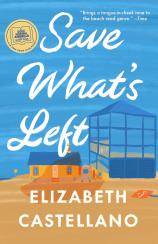Excerpt
Excerpt
Save What's Left

1
Never buy a beach house. Don’t even dream about one. Don’t save your money or call real estate agents or pick out a white couch. If you must do something, pray for the people who do own beach houses. Pity them. Certainly don’t, under any circumstance, envy them.
Maybe it’s too late for you. Maybe you’ve gone ahead and picked up some starfish tchotchkes and turquoise nonsense and you feel you’re in too deep. Well, then let me tell you right now that those warm summer nights you’re dreaming about will be spent arguing over parking restrictions and beach access. You won’t paint or write or play tennis. You’ll be too busy filing code enforcement complaints in the town attorney’s office. You’ll wake up to the sound of leaf blowers and you’ll either spend half your life trying to protect a tree or cut one down. The village will be charming. The view will be beautiful. You’ll attend countless meetings about how to keep them that way. Do yourself a favor and put a lawyer on retainer. Don’t waste any time about that. You will, without question, not be on speaking terms with at least one of your neighbors in a year’s time.
And, if you’re like me, you’ll eventually end up in a courthouse conference room in some godforsaken town, nervously clutching a tattered, overflowing, cardboard Christmas box with a picture of a dopey snowman and the words, “Bring on the Snow!” The box will be filled with letters and emails and blueprints and surveys and photos that began as minor grievances but are now exhibits in a money-laundering scheme. And what you’ll think to yourself as you stare at that stupid snowman and search frantically for a tissue to wipe away the sweat which now routinely rockets from the top of your head is this: Why did I ever buy that house?
The worst part about all of this, I mean the really worst part—worse than the alleged wire fraud or the ruined view or the mounting therapy bills—is that now I am one of these people. I’m now the kind of horrible person who genuinely cares about what so-and-so had to say about the traffic from the chowder festival. I’m the kind of person who has an opinion about whether the beach sticker should be placed on the front or rear bumper of the car. I know more than one person named Bunny. I spend weekends reconstructing osprey nests. I carry around Freedom of Information forms in my purse. I fantasize about a tsunami sweeping away my neighbor’s house and floating it out to sea (preferably with them in it). I, honest to God, look forward to town board work sessions airing on Channel 36. I’m the kind of person who has the town supervisor’s cell phone number posted on my refrigerator and who has cried more than once in the town attorney’s office. I’m that kind of person. The worst kind of person. I’m a beach person.
Three years ago, I didn’t have a beach house. Three years ago, I was a normal person. I had a husband, a job, and a house with no view in Kansas City. Every Sunday, my husband and I would go to the same diner for breakfast. We’d order two omelets. We’d request the same waitress. We’d eat at the same table. We’d leave the same tip. We’d talk about work or we wouldn’t talk at all. Then, one day, we went to a different diner and Tom ordered pancakes and he left me.
I don’t know about you, but I’d like to think that if I were rotten enough to leave someone over pancakes after thirty years of marriage, I’d have the decency to have a good, juicy reason for it. I’d, at the very least, have the decency to make something up. You’d like to think there’d be some seedy affair or coming-out proclamation or witness protection situation. But, Tom didn’t have any reason at all. He just looked up at me while he very casually poured his maple syrup and asked me, “So . . . do you think this is working?” I thought he meant the restaurant. I said I thought it was wonderful. I really did. I said, “I think it’s wonderful.”
I guess Tom hoped that I would say something like, “No, I see what you’re saying. It’s not working. Let’s get a divorce.” That would have been better. Then, we could have gone on enjoying our breakfast and possibly could have still made that stop at the estate sale on the way home to buy yet another old radio to add to Tom’s collection. Instead, Tom launched into a twenty-minute monologue about feeling trapped and stuck and in a rut and weighed down and a few more metaphors meant to say, “I just can’t stand you anymore.”
Tom said he needed adventure. He said he felt suffocated. He wanted to “find himself,” a phrase he no doubt picked up from one of his many self-help manuals about breathing and thinking and eating and general basic living. Whether Tom’s “self” was lost or never found in the first place, I don’t know. But, either way, he felt the most likely place to find it was on the Queen Mary 2 ocean liner. So, he went ahead and booked a solo ticket for a four-month world cruise. It was setting sail from New York in a week. “It’s the only way,” he said. “I’ve had a paradigm shift.” This was the man who needed the butcher to put pieces of paper in between each slice of American cheese—the one who had me ironing his boxer shorts for thirty years. It was the man who told me every summer that a beach vacation was not necessary because we belonged to the YMCA and that traveling to Europe would be nothing but a headache.
While Tom continued to walk me through all the reasons why he now considered our life to be unbearably dull, I started thinking about a pain in my rib that I had for about three years in the ’90s. I started thinking about it because the pain came back right around the time Tom mentioned that he was planning to purchase a tiny home and trailer it across the country when he returned from his world cruise.
The pain first started in 1994 when my daughter was six. I woke up with a lightning bolt feeling in my rib and like any good hypochondriac, I immediately consulted my 1978 copy of The Merck Manual of Diagnosis and Therapy, which I always keep on my nightstand in the event of such a situation. After a good deal of poking, I was able to identify the exact location of the pain—left side, fourth rib from the clavicle, smack-dab over my heart. If you’re wondering how it is that I was able to poke a rib that was sitting directly over my heart, well, then you’ll discover the reason why I married Tom in the first place. When I was twenty, I brought Tom home for Thanksgiving and my mother told me that if he ever asked me to marry him, I should accept because he was the best I would ever do considering my cup size, which was and remains nonexistent. This was bad advice. But, I took it. My mother also told me to never sign a prenup. This was good advice that I, of course, ignored.
Anyway, the pain in my rib lasted for about four days. On the fifth day, when it moved down my arm, I started writing my will. Lucky for me, my husband is a cardiologist. When he got home from work, he asked, “How was your day?”
“Pretty good,” I said. “I think I’m having a heart attack.” Something you should know about Tom is that he rides bicycles. Many people ride bicycles, but Tom has somehow managed to make it into a personality trait. It takes Tom at least fifteen minutes to enter or exit the house due to the amount of bicycle accouterments required for his everyday living. The news of my impending death did not interrupt this routine. When he finished clicking off his cleats and tucking them neatly into a basket beneath the bench by the door labeled Cleats, he asked, “Right now?”
“What?” I said.
“Right now you’re having a heart attack?”
“Yes, Tom,” I said. “Right now. Right now, I’m having a heart attack.” He walked over to me and asked me where it hurt. I pointed to the spot—fourth rib down from the clavicle, left side. Then, without saying a word, he took his index finger and gave me a tremendous poke right in that very spot. I lurched backward.
“You’re not having a heart attack,” he said and casually opened the refrigerator to gather the ingredients for his midafternoon cool-down protein smoothie.
“Well, I’m having something,” I said.
“It’s muscular,” he said. “Muscular or skeletal. Classic presentation. I see it all the time.” Tom was always saying things were classic presentations. I hated that.
Over the course of the next few years, the pain would come and go. I went to at least eight doctors. I had x-rays and MRIs and EKGs and all kinds of acronyms, which all came back perfectly normal. I was sick over it, the not knowing, I mean. I was sure there was a tumor buried somewhere in there, too small to show up on any scan. Then, one day, I was at the gynecologist and I happened to mention, just for the hell of it, that I get a terrible pain in my rib that seems to come and go at random. She said it was anxiety. She said everyone in the office had had it. “You’re hyperventilating,” she said. “Stop doing that.” And that was the end of my rib pain.
This is a long way of explaining why I was doing highly noticeable breathing exercises at breakfast. I resented Tom. God, did I resent him. Bad enough he was asking for a divorce, or a separation, or I don’t even know what he was asking for. But, now, my rib pain was back and I would have to go around until the end of time practicing something called triangle breathing and chewing gum and sucking on mints, all while Tom gallivanted off into the sunset. That’s the problem with a bad marriage. I don’t mean a bad marriage. I mean, a just-okay marriage—one that isn’t awful, but isn’t quite good either. It’s like a benign rib pain. It’s not lethal. It’s not causing excruciating pain. No one cares about it. You can still perform normal activities. It’s just a worrisome annoyance that eats away at you until one day it decides to leave.
Excerpted from SAVE WHAT'S LEFT by Elizabeth Castellano. Copyright © 2023 by Elizabeth Castellano. All rights reserved. No part of this excerpt may be reproduced or reprinted without permission in writing from the publisher.
Save What's Left
- Genres: Fiction, Humor, Women's Fiction
- paperback: 304 pages
- Publisher: Vintage
- ISBN-10: 0593469194
- ISBN-13: 9780593469194







